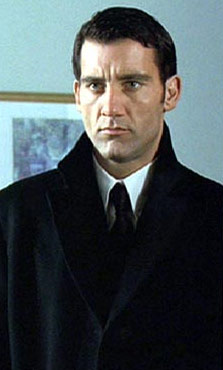 Mike Hodges’ “I’ll Sleep When I’m Dead” is a thoughtful exploration of the problems of identity and free will, two themes suited to the noir genre. Calling to mind the shadowy slipperiness in Alain Robbe-Grillet’s early novels, the movie follows its hero, the aptly named Will Graham (Clive Owen, dependably cool), as he comes to terms with the death of Davy, his profligate brother. Once a top gangster, Will has suffered an undescribed breakdown and has since disappeared into forests both literal and facial. Three years later he is summoned home almost supernaturally: signs, portents, the ghost of his brother. It’s no stretch to call him a criminal Iron John, a wild man who returns to civilization to share his hard-won wisdom. Mike Hodges’ “I’ll Sleep When I’m Dead” is a thoughtful exploration of the problems of identity and free will, two themes suited to the noir genre. Calling to mind the shadowy slipperiness in Alain Robbe-Grillet’s early novels, the movie follows its hero, the aptly named Will Graham (Clive Owen, dependably cool), as he comes to terms with the death of Davy, his profligate brother. Once a top gangster, Will has suffered an undescribed breakdown and has since disappeared into forests both literal and facial. Three years later he is summoned home almost supernaturally: signs, portents, the ghost of his brother. It’s no stretch to call him a criminal Iron John, a wild man who returns to civilization to share his hard-won wisdom.
To the surprise of his former colleagues, Will has seemingly abandoned his former life. He watches them with actuarial interest as they attempt to restore him to his former self. But knowing his true self—redacted by the inability to know Davy’s true self—supplants revenge as the focus of this lean, engaging crime story. The plot unspools little by little, drawing us in, but this is not a plot movie. Hodges banks everything on the random materialization of threat deep within London’s turbid underworld. As it moves forward, the story takes shape not by fiat but as if rising organically from the city. As Los Angeles was for Raymond Chandler, London is for Hodges the transparent interloper whose influence is more psychological than physical. “I been to London. It scared me”, a woman tells Will. “It’ll do that,” he quietly answers.
With Simon Fisher-Turner’s jagged jazz weaving through the muted midnight shrieks of a disembodied populace, the city itself becomes a kind of infernal chorus that announces a sinister determinism. One of the characters tells Will that his return has made certain things inevitable. “Someone’s gonna die”, he declares, as if forecasting a bit of afternoon rain.
Although Will’s investigation points to a big and bloody conclusion, Hodges has a few surprises in store. The determining condition of noir stories is imaginative claustrophobia: the characters who drive the story cannot see beyond the walls that are slowly closing in on them. Given this, Will’s vision leads him to a most logical conclusion. In fact, as ambiguous as the ending is, the last scene introduces the key to the movie’s puzzle. Signally, it takes place on a beach: the final act of Will (or will) can happen only outside the killing gravity of London.
But because Hodges resolves his movie philosophically rather than kinetically, there’s a resulting loss of crunchy pulp violence that ultimately makes Will an unconvincing figure. With his understanding of the fallibility of thought and memory, it’s clear that, even as events circle toward a body count, Will is too far gone. He belongs to airy speculation rather than the dialectics of fists and guns. Unlike the chilled, workmanlike tenacity of Terence Stamp in “The Limey”, Will’s demeanor gradually seems constitutional, inhibitive. More than anything else, his final scene on the shore—wrapped in black, watching the focus of his revenge at a remove—marks him as a Hamlet figure, and “I’ll Sleep When I’m Dead” as merely a fascinating experiment in meta-noir. |